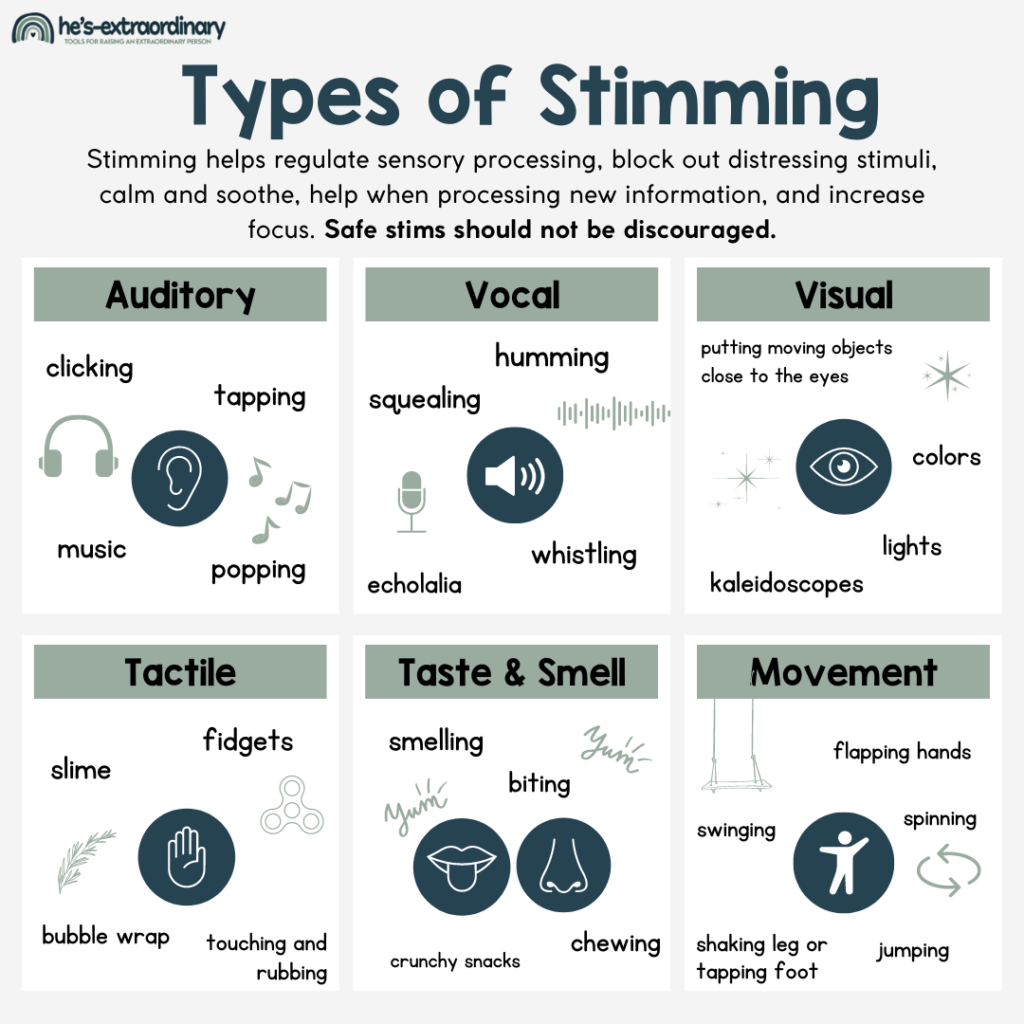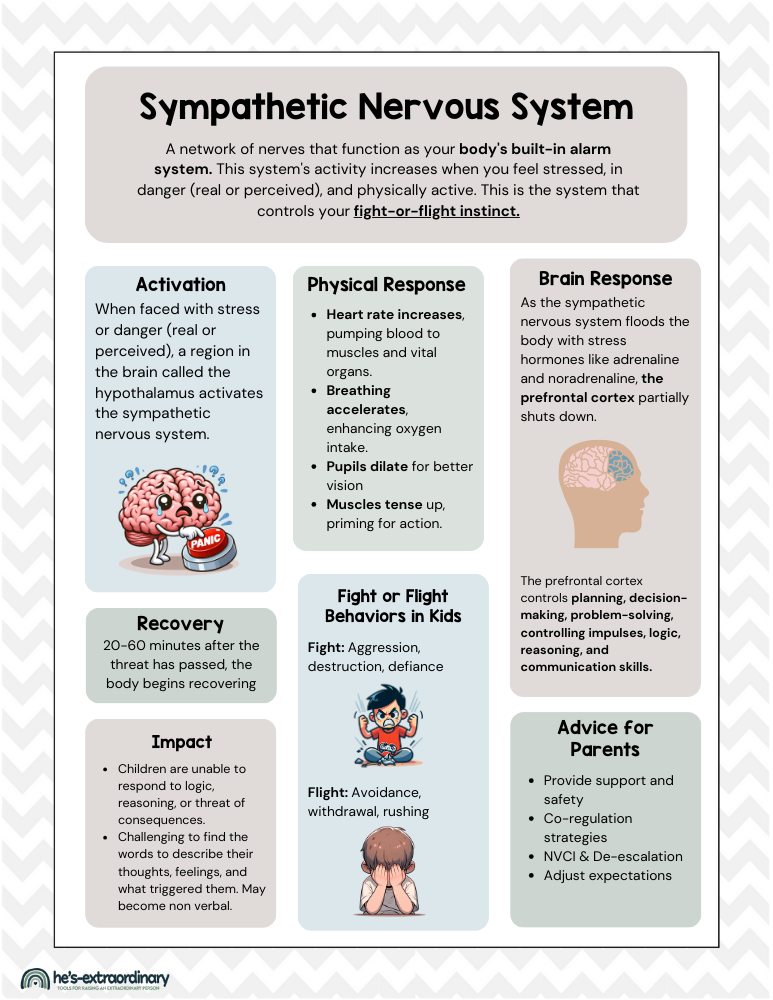4 Grave Misconceptions About Autism
What’s inside this article: We’re setting the record straight about four common misconceptions people have about autism. The aim is to build a greater unerlanding and level of acceptance of neurodiversity.
One of the biggest challenges that people on the autism spectrum and their parents face is being misunderstood. There are so many misconceptions about autism.
This leads to judgments towards autistic people and the parents of autistic children.
Society as a whole needs to not only become more aware but become more accepting of autistic individuals.
Current statistics say 1 in 68 people are diagnosed with Autism Spectrum Disorder. This means you probably encounter someone with autism more frequently than you realize.
So, here are just four of the many misconceptions about autism that I’ve encountered.
1. Stimming
Picture this: You’re in a room with a loud, buzzing light. To others, it’s barely noticeable, but to you, it’s overpowering. How do you cope? This is where “Stimming,” short for self-stimulatory behavior, enters.
Whether it’s hand-flapping, playing with hair, or even spinning, these are mechanisms to block distressing stimuli or to aid self-regulation.

What stimming is really about
Let me share a poignant, personal story. When I went to pick up my son from daycare, his teacher commented on a ‘strange noise’ he’d made, dismissing it as a deliberate attempt to annoy others.
The reality? It was a verbal stim.
My heart broke thinking of my son using his voice to block out something disturbing, being misconstrued as intentionally disruptive.
He was not trying to bug other children. In fact, that’s probably one of the last things he wants to do because he wishes he had friends.
He was self-regulating, and he was punished for it.
If my child had a visible disability, this would have gone very differently. If this were the case, the teacher would have been explaining to the other kids that he couldn’t help it or that he needed to do it, and wouldn’t be telling him to stop or removing him.
Situations like this are directly caused by people within our education system lacking the proper training to be responsible for children with special needs.
And here’s a revelation: We all stim!
The difference lies in what society deems “acceptable.” Nail biting, hair twirling, and foot tapping are common ways neurotypicals stim.
Lamar Hardwick described stimming by saying:
“Stimming is like turning down the radio when you think you smell something burning. Its a way of turning off the other senses”
2. Meltdowns
I wish this wasn’t true, but meltdowns are always going to be misunderstood.
Meltdowns stem from neurological overload, a point where the brain’s action control ceases, and fight-or-flight instincts take over.
Imagine a can of soda, shaken to its limit and finally bursting. It’s a cry for help, not a disciplinary issue.
This is not a child “playing games” or being “intentionally defiant”. They are overwhelmed and exhausted by the surge of emotions they cannot control.
Related: The Ultimate Guide to Preventing Meltdowns
Meltdowns are an automatic response caused by the activation of the sympathetic nervous system. The sympathetic nervous system is a network of nerves that function as your body’s built-in alarm system.
When faced with stress or danger (real or perceived), a region in the brain called the hypothalamus activates the sympathetic nervous system.
Once the message is received, your body undergoes a transformation.
- Heart rate increases, pumping blood to muscles and vital organs.
- Breathing accelerates, enhancing oxygen intake.
- Pupils dilate for better vision
- Muscles tense up, priming for action.
This is all part of the “fight or flight” response, automatically preparing you to either confront the threat or make an escape.
As the sympathetic nervous system floods the body with stress hormones like adrenaline and noradrenaline, the prefrontal cortex partially shuts down.
This part of the brain controls all your executive functions, including planning, decision-making, problem-solving, controlling impulses, logic, reasoning, and communication.
This stress response can happen to anyone, but due to a variety of factors beyond their control, autistic children and adults often have an overactive sympathetic nervous system.

Tantrums Vs. Meltdowns
There is literally a neurological difference between a meltdown and a temper tantrum.
People need to understand that when a child’s system is overwhelmed, the part of the brain responsible for controlling your actions shuts down. As a result, their fight or flight instinct takes over, and they have no control over their
Basically, meltdowns are uncontrollable outbursts that may be aggressive and unpredictable. It’s not a planned behavior that the child is using to get their way. And It’s not a discipline problem.
I personally have heard many times things like: “He thinks this is a game,” or “He just doesn’t want to listen today,” “He is intentionally being oppositional and defiant,” or “He needs more discipline, so he knows better.”
The list goes on.
But a child having a meltdown does not want to behave that way — it is physically and emotionally draining to experience this. It’s not a game, acting intentionally or being used as a method of getting what they want.
A meltdown is a child telling you that they are having a hard time and need help. How you support a child through a meltdown can have a significant impact on recovery time.
3. Rigidity
Children with autism thrive on consistent and predictable routines. I think this is one of the more commonly known “symptoms of autism,” but it’s often misunderstood what this really means.
Rigidity is not as simple as needing to do the same things in the same order every day. It is a deep need for sameness and predictability, often in the tiny details that most people don’t even notice.
Related: 9 Ways to Reduce Rigid Behavior and Encourage Flexible Thinking
It’s Grounding
Entering a classroom, you could see a child become distraught for “no reason,” but what actually happened is he noticed his desk was shifted 2 inches by the custodian the night before.
It’s grounding and reassuring to keep things the same in this unpredictable world. There is so little that children can control.
Other examples include not wanting to wear new clothes, insisting on having the same book bag and lunch bag, eating the same foods, only drinking from one particular cup, etc.
Once, something spilled in my son’s lunch bag, so I sent his lunch in a plastic bag while I cleaned it. He didn’t eat that day because he would not take food from a different bag.
Related: How to Provide More Structure to Help Your Child Thrive
If your child asks for a drink of milk and you pour that milk into a red cup instead of the blue cup that they use every day, they get upset. That is rigidity.
To an adult, it may seem trivial, and you may try to reason with your child. “The milk tastes the same no matter what color the cup is.”
But to a child with autism, this just makes the world seem even more unpredictable. It can cause extreme anxiety and meltdowns – which people interpret as a tantrum.
Consistent grounding events and routines can help a child with autism feel comforted. When changes do need to happen, there are ways you can make transitions easier so it is less upsetting.
4. Communication
While communication challenges are widely recognized in those with autism, the depth of these challenges is often overlooked.
Social and language skills can vary significantly from being completely nonverbal to having a superb vocabulary. However, there are a lot of misunderstandings between a person’s ability to speak and their ability to actually communicate and understand.
My son’s vocabulary was tested and found to be in the 99th percentile. This came as no surprise to me because he was speaking in small sentences shortly after his first birthday and hasn’t stopped since.
He talks from the moment he wakes up until the moment he falls asleep. It’s the main reason I missed the signs of autism.
However, we learned that his receptive language skills are only in the 7th percentile. This means he has a hard time following what other people are saying.
Additionally, he misses the meaning of body language, changes in tone of voice, facial expressions, etc. He also has trouble following complex directions, so it’s best to explain only one or two steps at a time.
The hardest part of all is the struggle to express emotions. He can talk about any physical object with his huge vocabulary and language skills. But he can’t use those words to describe abstract thoughts like how he is feeling.
Misconceptions About Communication Skills
Most people automatically assume that because someone can speak well, they can also understand well. However, receptive language and expressive language are two entirely different skill sets.
There have been times when my son was upset at school, and I had to do my detective work to find out what was wrong. Then, the teacher will say, “Why didn’t he just tell me?”
The answer is simple: he can’t.
He is not willfully refusing to tell others what he is feeling; he just can’t do it. He can’t take those thoughts from his head, and initiate a conversation with someone, and tell them what he’s feeling.
A lot of adults can’t even talk about their feelings and what makes them vulnerable, yet we expect children to automatically have this ability.
Communication skills vary significantly for everybody, but the main thing people need to understand is this: Just because a child is non-verbal does not mean they DON’T understand you. And just because a child is verbal does not mean they DO understand you.
Do not make assumptions.
Let’s Break the Misconception Bubble
What’s your takeaway about autism?
Are there misconceptions you’ve had that have been shattered? Or newfound realizations you’d like to share? Let’s dive into this conversation together.

